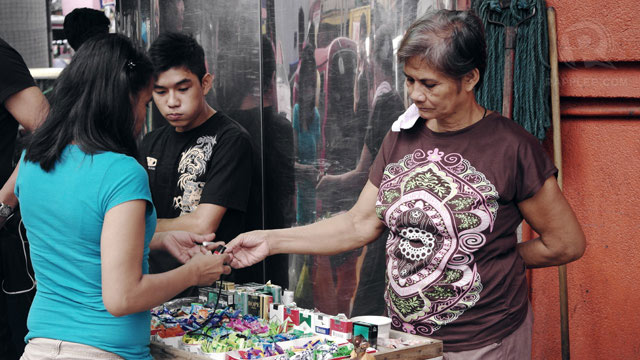SUMMARY
This is AI generated summarization, which may have errors. For context, always refer to the full article.

MANILA, Philippines – British American Tobacco (BAT), distributor of Lucky Strike in the Philippines, is looking to boost its market share on a more level playing field following the implementation of the sin tax reform law.
In a briefing with reporters on Monday, February 11, BAT Philippines General Manager James Lafferty said that in 2012, the company failed to meet its target to sell roughly 150 million sticks.
“Last year, I sold a few million sticks but this is a hundred billion stick market. Am I going to sell more this year? Yes, it’s not going to be easy for a small company but we’ll do our best,” Lafferty said.
Lafferty said the company plans to introduce new brands in the market. “We see the next opportunity is opening to bring in something else,” he said.
BAT is also behind tobacco heavyweights Dunhill, Kent and Pall Mall.
While it buys its tobacco locally, BAT is currently importing cigarettes from Malaysia.“We have been importing the product from Malaysia made form Philippine leaf. We’ll continue to do that while we evaluate the local manufacturing options,” said Lafferty.
“We will be manufacturing here at some point in time. We’re studying options from Mindanao to Luzon,” he added.
According to Lafferty, it took multinational cigarette company Philipp Morris 50 years to build a factory. “They came in 1955 and built a factory in 2001,” he said.
Lafferty said BAT is on track with its plan to invest $200 million over the next 5 years in the Philippines, an amount it promised when it was lobbying for the passage of the sin tax reform measure. “In light of these latest developments, and in anticipation of President Aquino signing the bill soon, we confirm that we are investing at minimum $200 million over the next 5 years. We are looking forward to competing in the market and contributing to the growth of the Philippine economy,” BAT wrote.
BAT is the second biggest tobacco company in the world but has only a 0.1% market share in the Philippines, which is dominated by PMFTC, the merged entity of Philip Morris and Fortune Tobacco Corp., which accounts for 94% of total cigarette sales.
“We’re taking on very well respected and big competitors who understand the market. We’re a modest company who is trying to build a foundation. Do business the proper way,” said Lafferty.
In 2009, the company temporarily exited the Philippine market after the Philippine government did not rule in its favor over a tax issue that classified its foreign brand, Pall Mall, as premium. After nearly a decade, BAT returned in 2012.
Old tax structure
The previous sin tax law taxed brands introduced to the market before 1997 based on their old retail prices, while brands that came in later were reclassified and taxed based on their recent and higher prices.
President Benigno Aquino III signed in December 2012 the sin tax reform law, which corrected inequities in tax structure. It removed the price classification freeze for old brands, and set a uniform tax rate for all brands in the future.
During the sin tax law debate, BAT lauded the reform bill as a step toward a more level playing field benefitting new players like them.
“The current system has been in place now for 16 years. It has benefited only a few industry players led by a monopoly but has not served the interests of the Philippine government, the general public, and new players like us who wished to invest and create new jobs. And HB 5727 seeks to finally end that,” Lafferty previously said. – Rappler.com
Add a comment
How does this make you feel?
There are no comments yet. Add your comment to start the conversation.